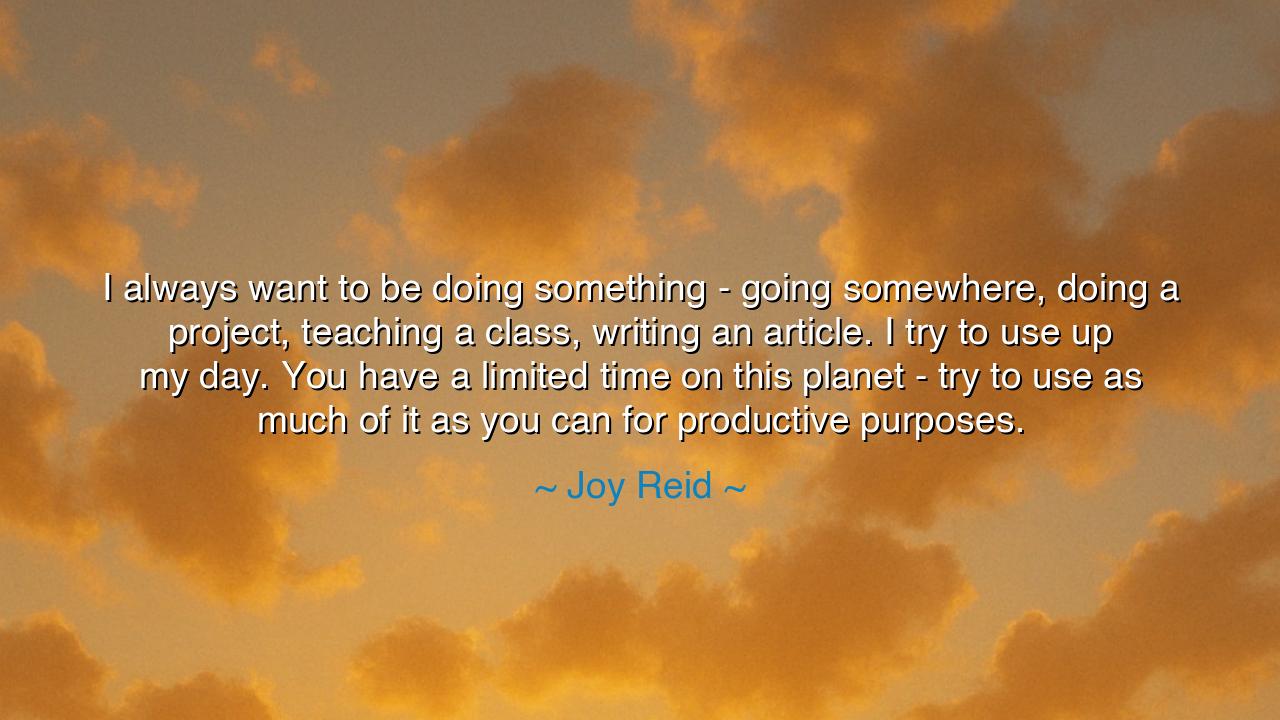
I always want to be doing something - going somewhere, doing a
I always want to be doing something - going somewhere, doing a project, teaching a class, writing an article. I try to use up my day. You have a limited time on this planet - try to use as much of it as you can for productive purposes.






Joy Reid, in her ceaseless energy and devotion to work, once proclaimed: “I always want to be doing something—going somewhere, doing a project, teaching a class, writing an article. I try to use up my day. You have a limited time on this planet—try to use as much of it as you can for productive purposes.” These words shine with urgency and purpose, for they remind us of the fleeting nature of life and the sacred duty to fill our days with meaning. The ancients, too, taught this wisdom: that time is a river flowing swiftly, and he who idles upon its banks will see his days swept away unused.
The heart of Reid’s words is twofold: first, the recognition of limited time; second, the call to productivity. She speaks not merely of busyness, but of purposeful labor: writing, teaching, building, creating. For the human soul is not made to sit stagnant; it is made to act, to give, to shape the world with its fire. To waste one’s days is to dishonor the gift of life; to use them fully is to join the heroic struggle of all who sought to leave the world better than they found it.
History gives us luminous examples of this truth. Consider the life of Leonardo da Vinci. His days were filled with endless pursuits: painting, inventing, dissecting, writing, imagining. To him, every hour was a vessel to be filled with discovery. He did not squander his limited time, but instead lived as though every dawn demanded creation. His legacy stands as proof that one who fills their days with passion and effort becomes immortal through their works. Like Reid, he seemed to hear the same command: “Do something. Create. Teach. Build. Leave nothing undone.”
Yet Reid’s words also carry warning. For too many wander through life as sleepers, lulled by ease, distracted by vanity. They forget that death waits silently, patient, but never failing. To them, time seems endless, yet in truth it slips away like sand between the fingers. The ancients would have called such idleness a sin against destiny, for each soul was placed upon the earth with purpose. And if the purpose is neglected, the flame is extinguished before its light has truly shone.
Still, Reid’s vision is not of frantic labor, but of meaningful use. To “use up your day” is not merely to fill it with tasks, but to devote it to things that endure: knowledge shared, words written, bonds deepened, projects completed. Productive purposes are not only work for wealth or acclaim; they are the shaping of wisdom, the nurturing of others, the creation of beauty, the pursuit of justice. Such labors do not drain the soul, but replenish it, for they align one’s life with the eternal order.
The lesson is thus: live each day as if it were both your first and your last. Let curiosity drive you to learn; let compassion guide you to teach; let courage move you to create. Ask yourself each morning: how shall I spend my limited time today? And answer not with hesitation, but with action. For one who fills their days with worthy deeds shall not fear the end, but will greet it as a warrior greets the close of battle—tired, yet triumphant.
Therefore, O seeker of meaning, let Joy Reid’s words stir you from slumber. Refuse idleness, resist waste, and rise each day to labor for what matters. Your days are numbered, yet each one is a treasure. Spend them lavishly on what is true and good. Write your story, build your project, teach your wisdom, shape your world. In this way, you will not merely pass through time—you will transform it into a legacy that endures beyond the measure of your years.






AAdministratorAdministrator
Welcome, honored guests. Please leave a comment, we will respond soon